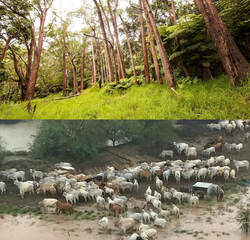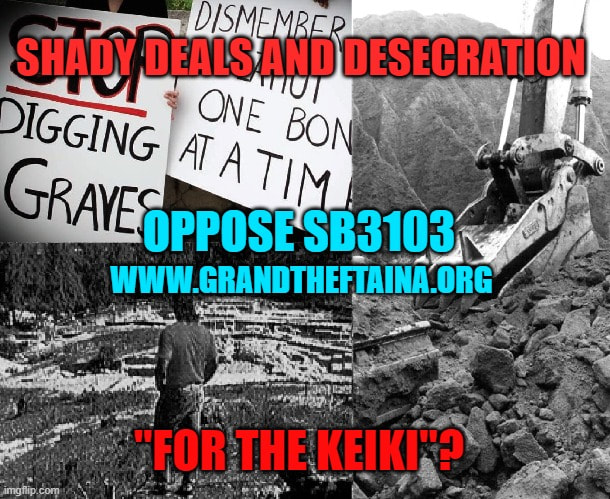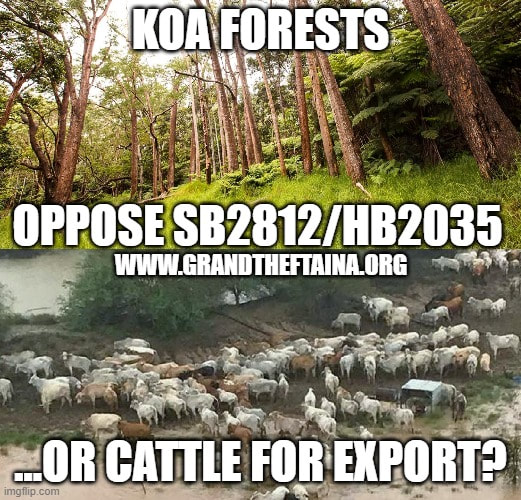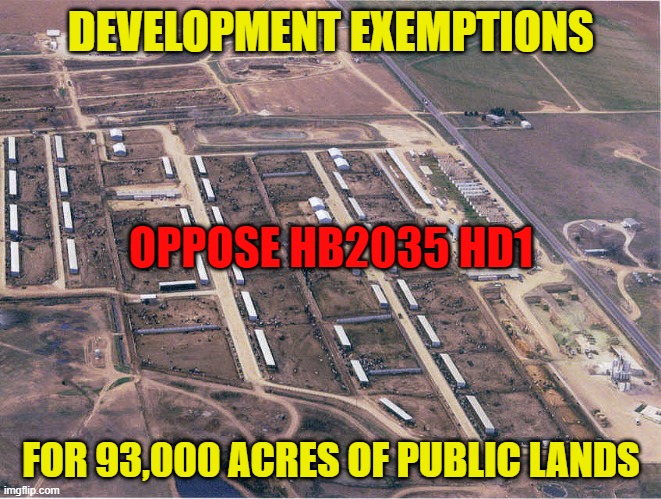 First, good news - the House Lower and Higher Education Committee amended SB3103, the School Facilities Agency bill, aka the "Desecration for our Keiki" bill, to strip out the proposed agency's environmental and historic preservation exemptions. Committee Chair Justin Woodson should be commended for hearing and addressing the environmental and cultural concerns around this controversial measure. Contact Senator Dela Cruz now at 586-6090 or via e-mail at [email protected] to voice your opposition to HB2035's public "pasture" land giveaway. Meanwhile, HB2035, the public "pasture" lands giveaway bill, was amended to reduce the 100,000-plus acres of public lands that would have been transferred to the Department of Agriculture, to specific parcels encompassing about 45,000 acres. Development exemptions would still apply to these lands once they are transferred, and vaguely described "watershed partnership plans" that would now be required for "current lessees" of these lands are unlikely to address hunting access, habitat protection, and other issues far outside of the expertise of the Department of Agriculture's staff person overseeing these lands. One notable amendment made was to require 50% of the livestock or meat raised on these public lands to be sold on the local market - a requirement that industry proponents are almost certainly fighting to remove, as we speak. Here's what one constituent had to say in their well-worded testimony on this amended bill: Aloha Chair Dela Cruz and members of the WAM Committee, This bill's "pilot program" is a thinly disguised special legislation to provide unfair advantages to a few big ranchers. Why would those four ranches be chosen and not others? This bill should be rejected and deemed unlawful special legislation. Further, the ranches that were chosen are actually the areas that have the most diverse and varied resources with the most public benefits. Because DLNR manages Kapapala Ranch, they have negotiated a large cooperative hunting area, access to the Ainapo na ala hele trail (and cabin) - ensuring that the public benefits on those public lands truly are enjoyed by the public. If the DOA manages that area, there will be no advocating for public access, hunting, and native forest protection. It is ironic that this bill, which is in theory supposed to help "food self sufficiency" would actually result in the blocking off of 28,000 acres of prime, accessible public hunting area for the community in the likely scenario that DOA does not work with the ranch to continue the cooperative Game Management Area, which DLNR oversees as the leasor. There are large tracts of lands in Mauna Kea that are sought to be transferred to DOA. I am from Hilo and spent a summer working near these lands to restore a koa forest which provided habitat for our imperiled forest birds. On one side of the fence was a lush native forest, and the other side was a barren treeless cattle pasture. These areas have the potential to naturally regrow. Many of the lands in Kapapala are still native forest. It is not pono to give some of our last remaining tracts of native Hawaiian forest and wilderness areas to DOA. Under DOA, cattle and "no trespassing" signs will be the only future for these public lands that have so much more potential for hunting, hiking, and our native plants and animals that could be our legacy for future generations. The ball is now in Senate Ways and Means Committee Chair Donovan Dela Cruz's court. Will he bow to the ranching industry's pressure to restore the bill and remove what minimal amendments have been made? Will he listen to concerns regarding the development exemptions and lack of oversight and public interest protections proposed for over 45,000 acres of public "pasture" lands? Contact Senator Dela Cruz now at 586-6090 or via e-mail at [email protected] to voice your opposition to this public "pasture" land giveaway.
0 Comments
ACTION ALERT 1 of 2: Desecration "For the Keiki" Bill, SB3103 SD2, Tuesday, June 23 SB3103 SD2, which would create a new "school facilities agency" and give it the power to exempt development projects from historic preservation, environmental, and public spending laws, has been scheduled for a hearing on Tuesday, June 23, at 1 p.m. before Chair Justin Woodson's Lower and Higher Education Committee ("LHE"). See the hearing notice here. As a recap, this bill would allow development projects to proceed without complying with the procurement code, and without preparing an environmental assessment or impact statement. The bill would also allow the agency's projects to break ground without historic preservation review, without an archaeological inventory survey, without consultation with any island burial council or cultural monitor or anyone at all, and could knowingly plow through Native Hawaiian or other ancestral graves or priceless historic artifacts without consequence. More information here: Shady Deals and Desecration, "For the Keiki". You can help stop this bad bill right now! E-mail your testimony to [email protected] or submit your testimony via the bill status page, and call or e-mail the LHE committee members (Do you know these legislators? Do they represent your district? Your voice could be even more critical to stopping this bad bill!). Sample script: "Dear Chair Woodson, Vice Chair Hashem, and Members of the Lower and Higher Education Committee, Please stop SB3103 SD2. While I support addressing our school facility needs, an agency exempt from procurement, environmental, and historic preservation laws will invite far more harm than good. These laws keep our children safe, uphold the trust of taxpayers, and stop the outright desecration of all ancestral remains, Native Hawaiian or otherwise. Please do not vote for its passage. Thank you for your consideration of this request. Signed, (your name)" ACTION ALERT 2 of 2: Cattle Industry Giveaway Bill, HB2035 HD1, Wednesday, June 24 HB2035 HD1, a public land giveaway to cattle ranching interests, has been scheduled for a hearing on Wednesday, June 24, at 12:30 p.m. before Chair Kai Kahele's Water and Land Committee ("WTL") and Chair Mike Gabbard's Agriculture and Environment Committee ("AEN"). See the hearing notice here.
As a recap, this bill would give large private cattle ranches even more control over tens of thousands of acres of ecologically and culturally significant public "pasture" lands they currently pay dollars per acre for, and transfer over 100,000 acres of these lands to the Department of Agriculture's non-agricultural park program, where they may be developed without complying with any state or county laws concerning "the development or improvement of land" and the "constructing of buildings thereon." More information here: Clear-cutting and "streamlined" development of native forests, public hunting grounds. You can help stop this bad bill right now! E-mail your testimony to [email protected] and [email protected] or submit your testimony via the bill status page, and call or e-mail the WTL and AEN committee members (Do you know these legislators? Do they represent your district? Your voice could be even more critical to stopping this bad bill!). Sample script: "Dear Chairs Kahele and Gabbard, Vice Chairs Keith-Agaran and Ruderman, and members of the Senate Water and Land and Agriculture and Environment Committees, I OPPOSE HB2035 HD1 because it will let private ranches ignore the public interest in up to 100,000 acres or more of public lands, by enabling the destruction of natural and cultural resources, the blocking of access to hunting grounds and cultural sites, and the development of agricultural facilities without environmental review or land use legal protections. Nothing is stopping private ranches from continuing to use public lands for their cattle operations, in balance with the many other interests and concerns of hikers, hunters, Native Hawaiian cultural practitioners, conservationists, and others in these lands. Please HOLD this measure and protect the public trust in our limited public lands. Thank you, (your name)" Sweetheart Deals Made Even Sweeter: The Ranch Corporations Behind the Public “Pasture” Lands Bill6/17/2020 As the 2020 Hawai‘i Legislature reconvenes over the next two weeks, word has it that HB2035 HD1, one of the “pasture” lands transfer bills, will be on the legislature’s shortlist of measures to pass in the expedited, limited-public-participation process it has planned for the remainder of this year’s session. This measure will remove the Department of Land and Natural Resources’ oversight over the natural resources, cultural sites, public accessways, and critical habitat contained in and adjacent to the 100,000-plus acres of lands to be transferred to the Department of Agriculture. The Department of Agriculture, meanwhile, has one staff person to oversee the comprehensive stewardship of these lands, and who has already testified that the Department’s support for this bill is simply because “the industry wants it.” "Rather than being appreciative of the incredibly discounted rents they have been given for years, if not decades, ranches and their industry backers are only asking for more." Despite the large amount of opposition and controversy arising from this bill, it has still made the shortlist of fast-track legislation to be passed this year, likely due to political pressure from the ranching industry. But why does the industry want this bill so bad? Why do private ranchers feel so entitled to the public lands they currently occupy, such that they want even less restrictions than the minimal conditions the DLNR requires of them to protect natural and cultural resources, our watersheds and water security, and public access? Dollars per acre: sweetheart deals breed entitlement? A review of the DLNR’s annual revocable permit renewal list for Hawai‘i Island reveals what could be the source of some of these ranchers’ sense of entitlement: years, in some cases decades, of continuous occupancy of thousands of acres of public land, for annual rent that amounts to no more than a few dollars per acre, if not less. Examples of just some of the permits that could be transferred under HB2035 are summarized below. Note: 2019 annual revocable permit rents are generally higher than what these revocable permit holders have historically had to pay. Kapāpala Ranch: Since at least 2010, has enjoyed the use of 8,215 acres of public lands, the equivalent of 6,223.5 football fields, for a 2019 annual rent of $3.10 an acre. Walter Andrade: Since at least 2004, between 2 revocable permits, has enjoyed the use of 2,203 acres of public lands, the equivalent of 1,668 football fields, for a 2019 annual rent of less than $4.25 an acre. BK Livestock: Since at least 1999, has enjoyed the use of 514 acres of public lands (389 football fields), for a 2019 annual rent of $5.58 an acre. Randy Cabral: Since at least 1999, has enjoyed the use of 37 acres of public lands (28 football fields), for a 2019 annual rent of less than $13 an acre. Jerry Egami: Since at least 2002, has enjoyed the use of 2,310 acres of public lands (1,750 football fields), for a 2019 annual rent of $3.65 an acre. Kahua Ranch, Ltd.: Since at least 2010, has enjoyed the use of 275 acres of public lands (208 football fields), for a 2019 annual rent of $14.05 an acre. Kuahiwi Contractors, Inc.: Since at least 2003, has enjoyed the use of 672 acres of public lands (509 football fields), for a 2019 annual rent of $5.50 an acre. Parker Ranch, Inc.: Since at least 2000, has enjoyed the use of 4,380 acres of public lands (3,318.6 football fields), for a 2019 annual rent of $4.91 an acre. These are just a few examples of the corporate entities that occupy tens of thousands of acres of public “pasture” lands, and who are using their political leverage to push through legislation to make their sweetheart deals even sweeter. Rather than being appreciative of the incredibly discounted rents they have been given for years, if not decades, ranchers and their industry backers are only asking for more. If anything, it appears that their years of discounted rents and unchallenged occupancy of public lands have led these entities to feel entitled to the vast benefits they have received from the public trust. "The damage to watersheds and reefs by livestock grazing and agricultural development projects . . . will only jeopardize our islands’ self-sufficiency." Exporting cattle does not help food security It is likely that industry proponents will argue that this bill will promote the local production of beef to meet our islands’ "meat security" needs, particularly in light of the COVID-19 pandemic. However, it bears repeating that the vast majority of cattle - 80% - raised in Hawai‘i is actually exported to the mainland, because they can command higher prices there. The price differential is unlikely to change, and there is nothing in these bills that would ensure that beef raised on public land will be sold on the local market. Exporting cattle does not help meet our local food security needs, and the damage to watersheds and reefs by livestock grazing and agricultural development projects on 100,000-plus acres of public lands removed from DLNR oversight (and exempted from state and county development and construction laws) will only jeopardize our islands’ self-sufficiency. You can stop this public land giveaway to the overly entitled ranching industry from taking place. Please spread the word/share this blog and contact Water and Land Committee Chair Kai Kahele and Agriculture and Environment Committee Chair Mike Gabbard, as well as the members of their respective committees (sample script below): All Committee Members: [email protected] [email protected] Individual Members: Kai Kahele: [email protected], (808)586-6760 Gilbert Keith-Agaran: [email protected], (808)586-7344 Mike Gabbard: [email protected], (808)586-6830 Russell Ruderman: [email protected], (808)586-6890 Gil Riviere: [email protected], (808)586-7330 Clarence Nishihara: [email protected], (808)586-6970 Karl Rhoads: [email protected], (808)586-6130 Kurt Fevella: [email protected], (808)586-6360 Laura Thielen: [email protected] (808)587-8388 Sample scripts for testimony/e-mails/phone calls:
"Aloha (Senator/Committee), I would like to express my strong opposition to HB2035, the "pasture" lands transfer bill, which the legislature appears intent on passing over the next few weeks. Such a controversial measure should NOT be passed in light of the limited opportunity for public participation and dialogue over its final amended form. Mahalo, (your name)" "Dear (Senator/Committee), I would like to express my strong opposition to HB2035, the "pasture" lands transfer bill, which the legislature appears intent on passing over the next few weeks. There is nothing in this bill to require that ranchers actually contribute to our local food supply, rather than continue to sell 80 percent or more of their livestock to the mainland market. There is nothing in this bill to protect our watersheds and protein-rich reefs that may be harmed by livestock grazing and agricultural construction projects without the DLNR's oversight. Please do not pass this measure during the 2020 session. Mahalo, (your name)" "Dear (Senator/Committee), I would like to express my strong opposition to HB2035, the "pasture" lands transfer bill, which the legislature appears intent on passing over the next few weeks. Ranchers already pay just dollars an acre for the thousands and thousands of public lands they have occupied for years, if not decades. By letting the Department of Agriculture grant them decades-long leases, without any public auction requirement or carefully tailored environmental protections, this measure would just give them even more leeway to ignore the public interest in the public lands they occupy. Mahalo, (your name)" |
JOIN THE FIGHTPlease share our news and memes, and link back to our website to help spread the word to those who should care. Archives
April 2021
Categories
All
|



 RSS Feed
RSS Feed
